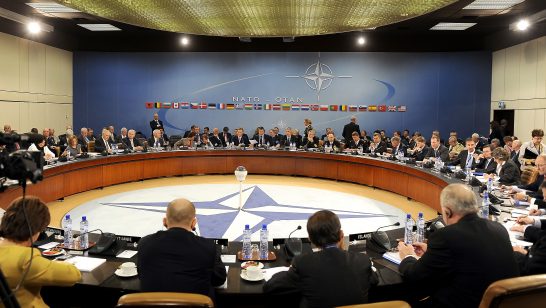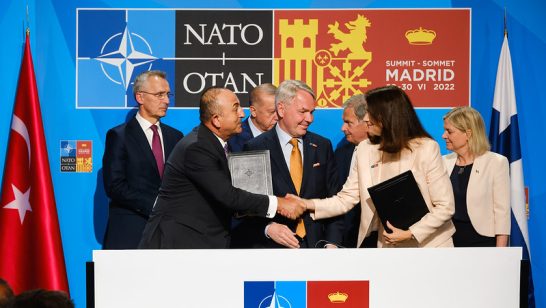
The NATO Summit in Wales was dominated by two key themes. It is hardly a surprise that the Ukraine crisis stood out in the political debates, but the huge impact that the rise of ‘Islamic State’ (IS, ISIS, or ISIL) had on the Summit declaration was a surprise. At a closer look, however, the two-fold focus on Ukraine and the Middle East makes perfect sense. These two core themes mirror the ongoing tensions between those who conceive NATO to be a global alliance, and those who want to limit its role to the regional level. The dichotomy between those who want NATO take charge of defence planning for member states, and those who want NATO to project security outside of its territory remains an obstacle to consensus. Despite the strong unifying impulse that the Russian aggressive behaviour in Ukraine has provided, those tensions are not likely to disappear.
Bearing this in mind, it is important to consider the interesting patterns of the recent U.S. debates on NATO. When summing up the outcomes of the Wales Summit, President Obama highlighted seven key achievements of the discussions: reaffirmation of Article V, reassurance of allies in Eastern Europe, initiation of a rapid response force, agreement on the importance of increased defence spending, decision of some member states to provide security assistance to Ukrainian authorities in addition to imposing further sanctions against Russia, transition to a new mission in Afghanistan, as well as development of more efficient partnership and enlargement policy. All these points were raised in the security debate in the months before the Summit, and all but one were in one way or another related to the Ukraine crisis.
It is fair to argue that the reactions to the decisions and initiatives agreed at the Wales meeting have been relatively sceptical. Among the most vocal critics, NATO scholar Julian Lindley-French assesses the outcomes of the Summit as “smoke and mirror commitments”, and “another pathetic attempt by European politicians to bridge the now unbridgeable gap between strategy and politics” [1]. Further, Judy Dempsey of the Carnegie Europe argued that “European nations have again been let off the hook when it comes to defence spending” [2].
Despite the criticism, the Ukraine crisis has in many ways actually revitalized the US ‘traditional’ (i.e. post-World War II) attitude to NATO and Europe. After years of rebalancing towards Asia, Europe is once again in the centre of U.S. attention. The position of the Obama Administration of what NATO is, what NATO should do, and how NATO should be led seems to have become more maximalist, which indicate a more important role of the Alliance in the US security thinking. Such a transformation in the rhetoric of the White House is indicative of a key change in conceptions of Euro-Atlantic security. Whether or not that is a permanent feature it is hard to say. But it is worth noting that the shift in the argumentation from the White House would remain unchanged in the immediate future.
On a general level, U.S. reaction to the Ukraine crisis has been rapid, forceful, and substantial. President Obama immediately took the lead. A further $1 billion was designated to bolster US military presence in Europe. Several of the most important US politicians – the President himself, the Vice President Joe Biden, and the Secretary of State John Kerry – have visited Europe (especially NATO’s new European member states) during the spring. Furthermore, NATO’s ‘Musketeer Paragraph’ – one for all and all for one – has been underscored time and time again, and economic and political sanctions against Russia have been implemented.
Further, the US view of what NATO is, and what it should be seems to have changed since the Ukraine crisis escalated. The alliance is no longer described by the administration solely as a military coalition of the willing or as a security hub, but instead as an organisation which is a guardian of the Western civilization and culture. Susan E. Rice, National Security Advisor to President Obama, for example, said in a speech at the State Department on 11 March, that Europe was the “partner of first resort on almost every critical global challenge,” and that the Alliance played a critical role around the world: “As the world’s pre-eminent security alliance, NATO is a bulwark for peace and security – of its members and partners alike. Particularly in light of recent events [i.e. in Ukraine], the NATO alliance and our summit this September will fortify the unshakable bond between Europe and the United States” [3].
In addition, the view of the US administration of what NATO should do seems to have shifted back to the days of the Cold War. The alliance is no longer described as a vehicle to promote collective military action for US strategic purposes, such as the wars in Afghanistan and Iraq. It is rather described as a vehicle to promote and defend Western values. For instance, when Vice President Biden held a speech in Romania on 21 May 2014 he said that it was a shared value system that was “the foundation of the Western alliance” [4]. The most fundamental of these values was not free markets, Biden continued, but “an open, free, and transparent society, where corruption is viewed as the enemy, where government is honest and accountable, and people are given a fair opportunity at success and all – regardless of their station – are treated with dignity.”
Finally, regarding how NATO should be led, the US has clearly taken the driver seat again. ‘Leading from behind,’ or ‘taking a back seat,’ expressions frequently used during the operation in Libya in 2011, have been dropped from the vocabulary of the administration and other influential actors in Washington, such as the US Congress, the think tank environment, and the elite media. For example, Fareed Zakaria, an influential columnist in The Washington Post, on 14 March 2014, wrote that the Ukraine crisis was “the most significant geopolitical problem since the Cold War” and that the US had to lead the way to solving it: “Obama must rally the world, push the Europeans and negotiate with the Russians” [5]. In this crisis, he argued “the United States truly is the indispensable nation.”
The change in rhetoric indicates that the most powerful nation in NATO, and in the world, is re-evaluating the Alliance’s place in its security policy. European security affairs are once again too important to be handled only by the Europeans. At the same time, the US has been quite clear – both before and during the Ukraine crisis – that the Europeans must take on a greater share of the burden within the Alliance. It will be interesting to see if European states actually will do that in the coming years, but there are not that many encouraging signs. The European NATO members are – with a few exceptions – not very keen on using military force for political purposes. But they seem, at least, to be willing to defend their territories and the territories of their allies. And that is a good start. NATO seems to be going back to basics.
——–
[1] Speaking Truth unto Power, Julian Lindley-French blog, http://lindleyfrench.blogspot.co.uk/
[2] J. Dempsey, NATO isn’t going anywhere, 8 September 2014; http://carnegieeurope.eu/strategiceurope/?fa=56561&reloadFlag=1
[3] http://www.whitehouse.gov/the-press-office/2014/03/11/remarks-national-security-advisor-susan-e-rice-department-state-s-global
[4] http://www.whitehouse.gov/the-press-office/2014/05/21/remarks-vice-president-joe-biden-romanian-civil-society-groups-and-stude
[5] http://www.washingtonpost.com/opinions/fareed-zakaria-on-ukraine-obama-must-lead-from-the-front/2014/03/13/10b9359a-aaea-11e3-af5f-4c56b834c4bf_story.html
The opinions articulated above represent the views of the author(s), and do not necessarily reflect the position of the European Leadership Network or any of its members. The ELN’s aim is to encourage debates that will help develop Europe’s capacity to address the pressing foreign, defence, and security challenges of our time.



